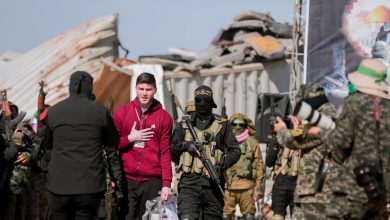Trump–Sharaa Secret Deal… Washington Offers Sanctions Relief in Exchange for Shocking Concessions!
First high-level contact in over a decade explores sanctions relief in exchange for political and security concessions from Damascus.
Watan-In a surprising and unprecedented development, reports have revealed a secret meeting between Syrian and American officials on the sidelines of the Brussels donor conference—the first of its kind in more than a decade.
The meeting brought together Syrian Foreign Minister Asaad al-Shibani and U.S. Deputy Assistant Secretary of State for the Levant, Natasha Franceschi. During the talks, the U.S. proposed a partial easing of sanctions on Syria in exchange for a set of political and security-related conditions.
According to informed sources, key conditions discussed included the destruction of what remains of Syria’s chemical weapons arsenal, the appointment of new officials “not affiliated with foreign militias,” and cooperation with Washington regarding the case of missing American journalist Austin Tice.

Cautious Optimism and Regional Jitters
The American move was met with cautious interest from Damascus, which is suffering under a crippling economic crisis and severe restrictions imposed by the Caesar Act sanctions. The offer is seen by the Syrian government as a potential opportunity to partially break its international isolation and revive its collapsing economy. However, within the U.S. administration, there is division over the value of such an opening—especially amid heavy Israeli pressure to keep Syria weak and isolated.
What’s particularly notable is that this potential rapprochement comes at a sensitive moment, as the region undergoes major shifts marked by the rise of new geopolitical axes and the retreat of American influence across several regional arenas. This raises serious questions: Are we witnessing the beginning of a genuine breakthrough? Or is this simply a temporary political maneuver? And could this step lead to a gradual lifting of U.S. sanctions imposed on Syria since 2011?
Meanwhile, regional powers like Iran, Russia, and China are closely monitoring the potential thaw with concern, viewing it as a direct threat to their interests in Syria. Israel also fears that any U.S. rapprochement might reduce its ability to carry out airstrikes inside Syrian territory if Washington recalibrates its stance.
All signs suggest that this secret agreement between the Trump administration and Syria’s new leadership may carry strategic implications—not only for Syria but for the broader political landscape of the Middle East






